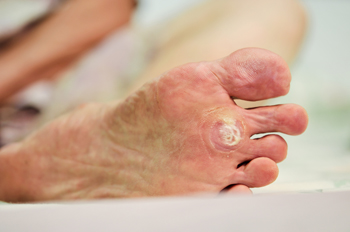
A plantar wart is a growth, usually found on the bottom of the foot, that is caused by the human papilloma virus (HPV). The virus enters the body through small cuts or breaks in the skin. Plantar warts are more common among children, teens, and seniors. Symptoms include a thickening of the skin and pain when walking or standing. They usually show up on the ball and heel of the foot. Small black dots may appear on the skin, which are dried blood from the capillaries. It is not a good idea to try to remove a plantar wart yourself. Instead, it is suggested that you visit a podiatrist, especially if the area changes color or bleeds, or if you have a compromised immune system. Among the remedies are topical creams, oral medication, laser treatments, cryotherapy (freezing the wart), acid treatments, or surgery. The podiatrist will also prescribe home foot care procedures as well as instructions for any medication prescribed. Please make an appointment with a podiatrist for safe and appropriate treatment options.
Plantar warts can be very uncomfortable. If you need your feet checked, contact Anas Khoury, DPM from North Eastern Foot & Ankle Specialists. Our doctor will assist you with all of your foot and ankle needs.
About Plantar Warts
Plantar warts are the result of HPV, or human papillomavirus, getting into open wounds on the feet. They are mostly found on the heels or balls of the feet.
While plantar warts are generally harmless, those experiencing excessive pain or those suffering from diabetes or a compromised immune system require immediate medical care. Plantar warts are easily diagnosed, usually through scraping off a bit of rough skin or by getting a biopsy.
Symptoms
- Lesions on the bottom of your feet, usually rough and grainy
- Hard or thick callused spots
- Wart seeds, which are small clotted blood vessels that look like little black spots
- Pain, discomfort, or tenderness of your feet when walking or standing
Treatment
- Freezing
- Electric tool removal
- Laser Treatment
- Topical Creams (prescription only)
- Over-the-counter medications
To help prevent developing plantar warts, avoid walking barefoot over abrasive surfaces that can cause cuts or wounds for HPV to get into. Avoiding direct contact with other warts, as well as not picking or rubbing existing warts, can help prevent the further spread of plantar warts. However, if you think you have developed plantar warts, speak to your podiatrist. He or she can diagnose the warts on your feet and recommend the appropriate treatment options.
If you have any questions please feel free to contact our office located in Passaic, NJ . We offer the newest diagnostic and treatment technologies for all your foot and ankle needs.
